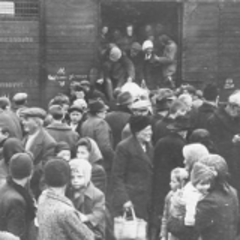
Over the course of more than two millennia, Jewish texts have transitioned from scroll to codex to book – and now to the digital age. This talk will survey the classical Jewish sources (Bible, Mishnah, Talmud, Haggadah, etc.) from before the age of printing, now available on the internet for the public at large to view, read, and study. This talk will bring this old-new world of Jewish Studies scholarship to the general community in an accessible manner. He will focus both on the contents of the manuscripts (especially when they differ from later printed editions) and the history of these documents, including their preservation in museums and libraries for centuries, along with the move to greater access in the current digital age. (1:15:49 min.)

 The Dead Sea Scrolls Reader
by
The Dead Sea Scrolls Reader
by
Jews have lived in the United States since 1654 — before the states were even united — when twenty-three Sephardic settlers fled to New Amsterdam. Today, the Jewish population of America stands at 7.5 million. Overcoming brutal sweatshop conditions, assimilationist pressure, antisemitic regulations and even lynchings, American Jews have helped positively shift the country’s politics and economics. Though they weren’t always welcomed with open arms, and despite the challenges they have faced over time, American Jews have flourished in what is now home to the world’s second largest community of Jews. (7:58 min)
Encyclopedia Britannica
Holocaust, Hebrew Shoʾah, Yiddish and Hebrew Ḥurban (“Destruction”), the systematic state-sponsored killing of six million Jewish men, women, and children and millions of others by Nazi Germany and its collaborators during World War II. The Germans called this “the final solution to the Jewish question.” The word Holocaust is derived from the Greek holokauston, a translation of the Hebrew word ʿolah, meaning a burnt sacrifice offered whole to God. This word was chosen because in the ultimate manifestation of the Nazi killing program—the extermination camps—the bodies of the victims were consumed whole in crematoria and open fires.

What is Zionism? We hear the term a lot, but what does Zionism mean? Here's a three-minute history from SOAS professor, historian and author, Colin Shindler. (3:17 min.)
Why do Israelis keep having elections? What parties make up the Knesset — Israel’s parliament? A party needs at least 61 seats to form a government, but no single party has ever come close to winning that many seats, which means that parties have had to team up with one another to form a “Coalition Government.” Currently, getting those 61 seats has proved more of a challenge than ever, causing Israelis to go to the polls four times in three years. Will the Lapid-Bennett government last? This video will help you make heads and tails of what you read in the news - the issues at hand, the various politicians, what “right” and “left” even means anymore, and how one man — Benjamin Netanyahu — managed to eclipse even the Israeli-Palestinian conflict. (9:55 min.)
